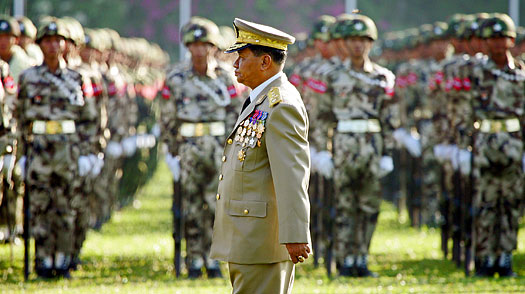Over the past few months, the international community has adopted a “new focus” on Burma amid concern that the country’s upcoming elections will not be democratic, diplomats said ahead of a ministerial meeting between the EU and the Association of South East Asian Nations (ASEAN) in Madrid on 26 May 2010.
Insistence on human rights gone?
The EU and its allies, such as the United States and Australia, wer e maintaining their sanctions and insistence on democracy and human rights in Burma, while “opening the door to dialogue,” said Jose Eugenio Salarich, a Spanish senior official responsible for relations with Asia and the Pacific.
e maintaining their sanctions and insistence on democracy and human rights in Burma, while “opening the door to dialogue,” said Jose Eugenio Salarich, a Spanish senior official responsible for relations with Asia and the Pacific.
The EU and Spain “do not believe in a policy of a pure and simple isolation” of Burma, Salarich said.
“There is a tendency towards a Dialogue,” he said, citing the recent visit of US envoy Kurt Campbell to Yangon as an example.
“The EU believes that despite everything there is room for manoeuvre,” olther European diplomat said.
Condition – to meet opposition
The EU mission would be the first to Burma since 2002, and will only take place if the junta allows the EU delegates to meet opposition representatives, Salarich said.
The Myanmar opposition includes Nobel Peace Prize laureate Aung San Suu Kyi , who has spent 14 of the past 21 years under house arrest. Myanmar has been under military rule since 1962.
NLD dissolved
Suu Kyi’s party, the National League for Democracy (NLD), was dissolved after deciding not to contest the elections at an as-yet unspecified date this year.
An NLD spokesman Nyan Win said on 29 May 2010 the party had decided not to register because of “unjust” electoral laws, which were  announced in early March.
announced in early March.
The laws announced by the junta required the NLD to expel its detained leader, Aung San Suu Kyi, because she has a criminal record. The election law prohibits parties with members currently in detention, so a decision to register would force Suu Kyi out of the party.
Its refusal to register means the NLD will no longer be legally recognised.
ASEAN to press Burma?
The EU will maintain its insistence on democracy in ASEAN Member Burma, but no “great progress” was expected, diplomats said before the meeting of officials from the EU and ASEAN on 25 May in Madrid and foreign ministers’ on 26 May 2010.
ASEAN comprises Brunei, Myanmar, Indonesia, Laos, Cambodia, the Philippines, Malaysia, Singapore, Thailand and Vietnam.
The EU foreign ministers reiterated a call for Suu Kyi’s release and said the country’s challenges “can only be addressed through genuine dialogue between all stakeholders, including the ethic groups and the opposition.”
The United States has led international condemnation of the laws that Burma has enacted for the ballot.
Last month the UN Human Rights Council passed a resolution expressing concern that election laws failed to include the necessary elements to guarantee an inclusive political process.





